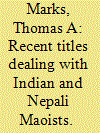| Srl | Item |
| 1 |
ID:
133589


|
|
|
|
|
| Publication |
2014.
|
| Summary/Abstract |
Anchored in the Santiago General Cemetery, this essay analyses the management of revolutionary memory under neoliberalism. Juxtaposing the gravesites of Salvador Allende and Víctor Jara, I theorise the gendered and racialised processes through which collective dreams for justice - and even radical politics themselves - come to be co-opted under neoliberal capitalism. If in Jara's grave we see the state performing the part of the hyper-masculine disciplinarian father, I argue, in Allende's grave we witness the state as the begrudgingly accepting father, ready to take in the repentant children back into the nation, in exchange for obedience. Finally, I turn to alternative memorialisation practices performed by the nation's discontents, and namely ongoing struggles for collective self-determination and decolonisation. Ultimately, I situate critiques of neoliberalism in Chile in dialogue with intersectional queer and transnational feminist scholarship on the seductive logics of neoliberalism - and emergent forms of justice that appear just beyond its purview.
|
|
|
|
|
|
|
|
|
|
|
|
|
|
|
|
| 2 |
ID:
131986


|
|
|
|
|
| Publication |
2014.
|
| Summary/Abstract |
A joint publication of the International Work Group for Indigenous Affairs (IWGIA) and Bindrai Institute for Research Study and Action (BIRSA), this treatment reads as a cross between a Zapatista manifesto and useful scholarship. It is worth quoting in full the cover blurb, because it illustrates well an approach which emerges in perhaps a majority of the works on Indian Maoism: 'The basic line of inquiry concerning the issues (dispossession from life supporting resources of land, forest, water and identity), the main cause (internal colonialism) and the remedy (provision of autonomy), has been discussed by leading social scientists and activists. In the process can be seen emerging a development critique with an alternative provided by the tribal/indegeous [sic] perspective aimed at reconstructing a society based on equality; economy based on cooperation, caring-sharing conservation, subsistence and decentralization; a policy based on conscience democracy [sic] and art based on collective participation and enjoyment.
|
|
|
|
|
|
|
|
|
|
|
|
|
|
|
|